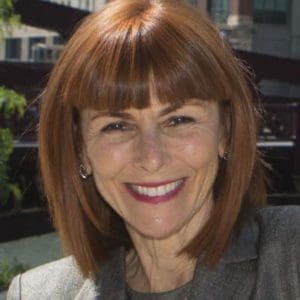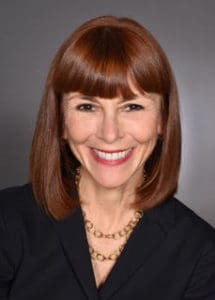Coach, Consultant, and Conflict Specialist. Member Spotlight: Dr. Linda Beitz
When asked for her advice to those starting out in the field, she said ‘run, don’t walk, to develop both your inner and outer game as an agent for change – always asking yourself, who do you need to become as a human being, not just a skillful practitioner, to bring peace into the room or change within the system?’

Professional and Life Journey
Linda has spent more than three decades helping people and organizations navigate change, exercise effective leadership, and harness the growth opportunity available in moving productively through conflicts that are an inevitable part of people working and living together.
She has served as a coach, consultant, mediator, organizational leader, facilitator, and author. The common theme throughout her journey is a passion for supporting people in being more connected, capable, and human together – at work and in life. ‘There will always be much that can disconnect us from one another – we need to grow in ways that help us overcome that automatic tendency and recognize our fundamental connectedness as human beings. Hopefully, prompting us to act in ways that reflect our interdependence as an eco-system. If the pandemic has shown us anything – it is that our very survival may depend on our internalizing this.’
Beginning her career in Chicago USA working with children and young adults with significant disabilities during the advent of Public Law 94-142, the Education for All Handicapped Children Act, Linda was drawn early on to honing her leadership capacities so she could further the systemic changes needed to realize an educational system that works for everyone, not just some. She earned a Doctorate in Education Administration and lived in Indiana, Chicago, and Vermont, working in a variety of leadership and consultant roles in education, including two national system change efforts funded by the US Department of Education. These provided her with first-hand experience in understanding and managing the conflicts inherent in mandated inter-organizational arrangements across local, state, and federal levels.
After a decade-long hiatus living in London, UK, and starting her family, she returned to Vermont in 1998 and became actively engaged in the Waldorf School community – serving on the Executive Board and then in an administrative capacity at the high school she helped establish. It was while working within the supportive and loving community of the local Waldorf School, an educational system that is philosophically and pragmatically wedded to a fully egalitarian model of family, teacher/staff, and Board partnership, that she felt compelled to expand her capacity for being able to facilitate productive conflict. Bringing more people into the conversation for change demands conflict competence. In 2008, she added mediation and dialogue facilitation to her toolbox after completing a year-long program at the former Woodbury College in Vermont.
At that same time, she had the good fortune of becoming involved with the newly founded Mediators Beyond Borders International and its dedicated cadre of seasoned conflict practitioners. Linda served for several years as co-chair of MBB’s Lessons Learned Committee – interviewing returning trip participants about their experiences working together in fostering peace in conflict hot spots around the world. ‘Being a part of MBBI continues to be an endless source of inspiration for me about what people committed to peace can achieve in the midst of what are typically seen as the most intractable conflicts in the world’.
Following her mediation training, in 2009, Linda founded her company, Solutions Through Dialogue, LLC. She has mediated hundreds of cases and facilitated many dialogues among individuals and groups stuck in negative conflict across industry sectors – however, the bulk of her work since returning to Chicago in 2012 has been in consulting, coaching, and training with individual leaders and teams to make the shift from ‘reacting to creating in leading change’.
In that vein, in 2012, she added Appreciative Inquiry (AI), a model for positive change in human systems developed by David Cooperrider, to her practitioner repertoire. Putting it to good use from 2012 – 2017, while on staff for the Schoolwide Integrated Framework for Transformation (SWIFT) Center at the University of Kansas. Linda was instrumental in having the principles and practices of AI become the cornerstone of the Center’s strengths-based technical assistance approach to working with 5 states and 64 schools toward increased equity and excellence in public education for all children. It was also during that time that she co-authored A Positive Manifesto – How Appreciative Schools Can Transform Public Education (Burrello, Beitz, and Mann, 2016).
Linda has also developed specialized expertise in coaching leaders who rub people the wrong way. Leaders who may be very talented in getting results, but who are perceived to have chronic patterns of abrasive behavior that result in co-worker stress, destructive conflict, and negative workplace culture. The people who are called bullies or toxic leaders – even sociopaths. While clinical pathology may be present in some, her own experience is that many leaders who show up in these ways often lack significant empathic insight and emotional intelligence – and can learn both.
Some Guiding Principles
 A few fundamental principles underpin Linda’s approach. First, ‘we can’t change systems without changing ourselves’. Leaders are learners. If we’re looking for a different result – waking up to how we’re showing up in the face of any relationship, circumstance, or change endeavor is the fastest gateway to the possibility of realizing the desired future. That’s why coaching figures largely in her current work. ‘It’s human to have blind spots – getting the support of an ally who can help leaders and teams gain insight into how they’re showing upholds the potential to be a powerful effectiveness accelerator’.
A few fundamental principles underpin Linda’s approach. First, ‘we can’t change systems without changing ourselves’. Leaders are learners. If we’re looking for a different result – waking up to how we’re showing up in the face of any relationship, circumstance, or change endeavor is the fastest gateway to the possibility of realizing the desired future. That’s why coaching figures largely in her current work. ‘It’s human to have blind spots – getting the support of an ally who can help leaders and teams gain insight into how they’re showing upholds the potential to be a powerful effectiveness accelerator’.
Secondly, ‘the more distinctions you have to make sense of the circumstances you’re facing – the more capable you can become in choosing how to respond’. She sees extraordinary leaders as ordinary people who have acquired many distinctions for what it means to be a leader and exercise leadership effectively. ‘Understanding the distinctions and mastering the practices – mind, body, and spirit – that support conflict competence can contribute to our being extraordinarily effective leaders in all aspects of our life’. Linda thinks it is a hopeful time given our access to knowledge across a myriad of fields – neuroscience, psychology, positive organizational scholarship, wisdom traditions, social sciences, philosophy, ontology, and more – to advance our practice as conflict practitioners and leaders.
Her last one is in the form of a quote from leadership experts Heifetz and Linsky – ‘People are the problem and they are the solution’. She views a lot of relationships, community, group, and organizational conflict as being rooted in people experiencing themselves as unseen and unheard. It’s her belief that leaders in all sectors of society need to get better at bringing more people into the conversation for change by becoming more skilled in dialogue facilitation.
Final thoughts
Linda strives to take multiple opportunities every day to breathe, reflect, practice gratitude, and demonstrate love. She’s humbled and buoyed by all the people in the world – like those reflected in MBBI’s stories – who are committed to a just, peaceful, and workable world for all.
Article by Lizzy Nestor, MBBI Writer
